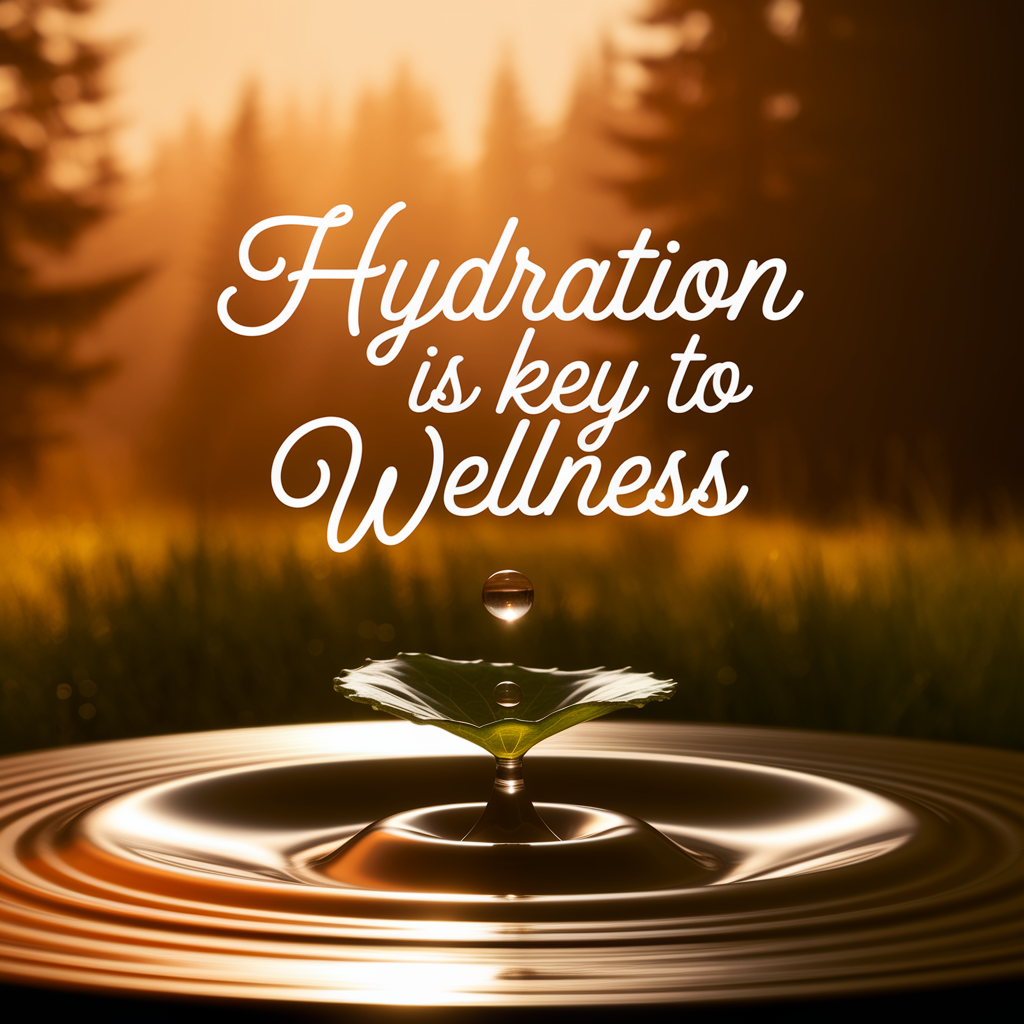The Role of Hydration in Overall Wellness
When was the last time you took a moment to consider your hydration habits? For many of us, life rushes by in a series of meetings, errands, and social engagements, leaving little time to reflect on the most fundamental aspect of our health—water. Yes, that clear, tasteless liquid that somehow manages to be both the source of life and a subject of endless debates about how much we actually need each day. Spoiler alert: it’s more than we often think. This article dives deep into the role of hydration in our overall wellness, exploring its myriad benefits, the science behind it, and perhaps a few personal anecdotes that might resonate.
The Science of Hydration
Water makes up about 60% of the human body. Yes, you read that right—60%! This staggering percentage highlights just how crucial hydration is for our survival and day-to-day functioning. Our bodies rely on water for a multitude of processes:
- Regulating Body Temperature: Through sweat and respiration, water helps keep our body temperature in check.
- Joint Lubrication: Synovial fluid, which cushions our joints, is primarily water. Without adequate hydration, those joints can feel like rusty hinges.
- Nutrient Transportation: Water is essential for transporting nutrients and oxygen to cells and for removing waste products.
- Cognitive Function: Even mild dehydration can impair concentration, alertness, and short-term memory.
Now, I remember a time when I was so engrossed in a project that I forgot to drink water for several hours. By the time I realized it, my head was pounding, and my focus had dwindled to that of a distracted toddler. It’s a classic example that underscores how dehydration can sneak up on you, often without warning.
Daily Water Needs: How Much is Enough?
If you’ve ever Googled “how much water should I drink each day?” you know that the answers can be as varied as the sources themselves. The oft-cited benchmark is the “8×8 rule”—eight 8-ounce glasses of water a day, which totals about 2 liters or half a gallon. But is this enough? Or perhaps too much?
According to the U.S. National Academies of Sciences, Engineering, and Medicine, the adequate intake for men is about 3.7 liters (or about 15.5 cups) of total water per day, while for women, it’s around 2.7 liters (or about 11.5 cups). This total includes all beverages and food. Yes, you heard that right—your morning coffee, that juicy watermelon slice, and even the soup from your favorite restaurant all contribute to your hydration levels.
But let’s face it: not all of us are counting every ounce we consume. (If you are, kudos to you! You probably have a water bottle that tracks your intake, too.) Personal needs vary based on factors such as age, gender, activity level, and climate. For instance, a marathon runner will need significantly more water than someone working in an air-conditioned office all day. Personal experience tells me that when I’m sweating it out on a hot day, I can drink 3 liters and still feel thirsty. It’s a peculiar game of hydration.
The Impact of Dehydration
Dehydration can creep up on you, and its effects can be surprisingly debilitating. Experts suggest that mild dehydration—losing just 1-2% of your body weight in fluids—can lead to fatigue, headaches, and decreased cognitive performance. It’s like trying to run a marathon in flip-flops; you might make it, but it’s going to be a bumpy ride.
In more severe cases, dehydration can lead to serious health issues. Consider these potential effects:
- Kidney Stones: Chronic dehydration can increase the risk of developing these painful stones.
- Urinary Tract Infections: Insufficient water intake can lead to concentrated urine, fostering bacteria growth.
- Heat Injuries: In hot weather, dehydration can lead to heat exhaustion or heat stroke.
It struck me one summer during a hiking trip—my friends and I were having a grand old time until one of us started feeling dizzy and nauseous. It turned out he hadn’t had a sip of water since breakfast! We quickly remedied the situation, but it was a stark reminder of how quickly things can go south when hydration is neglected.
Hydration and Physical Performance
For athletes and weekend warriors alike, hydration is a game-changer. Studies show that even a 2% drop in body weight from fluid loss can lead to a noticeable decline in athletic performance. Whether you’re running, cycling, or just trying to keep up with your kids at the park, staying hydrated can improve endurance, strength, and overall performance.
Here’s a quick breakdown of hydration’s role in exercise:
- Increased Endurance: Proper hydration helps maintain blood volume, allowing your heart to pump more efficiently.
- Temperature Regulation: Water helps cool the body through sweat, preventing overheating during strenuous activities.
- Reduced Muscle Cramping: Staying hydrated can help prevent those dreaded muscle cramps that can strike mid-workout.
I remember one particularly grueling soccer game—hot sun, tough opponents, and the realization that my water bottle was empty by halftime. Let’s just say I was more of a spectator in the second half. Lesson learned: hydrate, hydrate, hydrate!
Hydration for Mental Clarity and Mood
It’s not just our bodies that suffer when we’re low on fluids; our minds take a hit, too. Research indicates that dehydration can lead to mood swings, increased fatigue, and even anxiety. Think about it: how often have you snapped at someone or felt unusually irritable, only to realize you hadn’t had enough to drink?
Studies suggest that even mild dehydration can negatively impact cognitive performance. A group of researchers at the University of Connecticut found that just a 1.5% fluid loss led to significant reductions in mood and concentration. So, the next time you find yourself staring blankly at your screen, consider reaching for that water bottle instead of that third cup of coffee.
On a personal note, I often find myself reaching for water when I’m feeling sluggish mid-afternoon. It’s amazing how a simple glass of water can refresh my mind and help me refocus. It’s like a reset button for my brain. Who knew something so simple could wield such power?
Best Practices for Staying Hydrated
Now that we’ve established that hydration is pretty darn important, let’s talk about how to make sure we’re drinking enough water. Here are some tried-and-true tips that have worked for me and countless others:
- Carry a Water Bottle: Having a reusable water bottle on hand makes it easier to sip throughout the day.
- Set Reminders: Use your phone or a hydration app to remind yourself to drink water regularly.
- Infuse Your Water: If plain water doesn’t excite you, add some fruits or herbs for flavor.
- Drink Before Meals: Having a glass of water before meals can help with portion control and digestion.
In my experience, infusing water with slices of lemon or cucumber can make a mundane task feel a bit more luxurious. It’s a small touch that adds pizzazz to hydration!
Hydration Myths and Misconceptions
As with any health-related topic, hydration is surrounded by myths and misconceptions. Let’s debunk a few:
- Myth 1: You only need to drink water when you’re thirsty.
Fact: Thirst is often a sign that you’re already dehydrated. - Myth 2: All beverages count towards hydration.
Fact: While beverages do contribute, water is the best option for optimal hydration. - Myth 3: You can’t drink too much water.
Fact: Overhydration can lead to water intoxication, a rare but serious condition.
It’s curious how misinformation can spread like wildfire. I encountered one person who swore that coffee was dehydrating, and while it does have a mild diuretic effect, moderate coffee consumption can still contribute to overall hydration. Just another example of how we must sift through the noise to find the truth.
Special Considerations: Age, Activity Level, and Climate
When it comes to hydration, one size definitely does not fit all. Various factors such as age, activity level, and climate can significantly impact how much water we need.
Age
As we age, our bodies become less efficient at conserving water. Older adults may not feel thirsty even when they are dehydrated. Hence, it’s crucial to encourage regular water intake, even when the body doesn’t seem to signal a need.
Activity Level
For those of us who lead active lifestyles, hydration needs can increase dramatically. Athletes need to pay close attention to fluid intake before, during, and after exercise. Research indicates that drinking water is essential to replenish fluids lost through sweat and exertion.
Climate
Living in a hot, dry climate can escalate hydration needs. In such environments, it’s essential to adjust fluid intake accordingly, as heat and lower humidity can lead to increased fluid loss through sweat and respiration.
On a hiking trip in the sweltering mountains, I learned this lesson the hard way. Carrying an extra bottle of water might seem cumbersome, but trust me, it’s worth it when you’re scaling a rocky trail under the blazing sun.
Conclusion: The Water You Drink, The Life You Live
In conclusion, hydration is not just a health trend; it’s a fundamental pillar of overall wellness. From physical performance to mental clarity, the benefits of proper hydration are too significant to overlook. We’ve explored the science, debunked myths, and shared personal experiences which reveal that staying hydrated can truly enhance our lives.
So, as you read this, I encourage you to take a moment, grab that water bottle, and take a sip. You might just find that a little hydration goes a long way. After all, it’s the simplest things in life—like a refreshing glass of water—that can make the biggest difference. Cheers to that!






